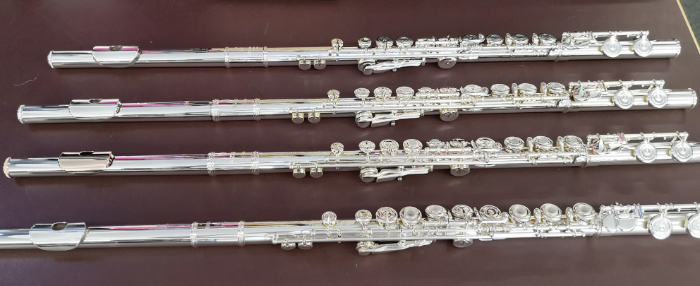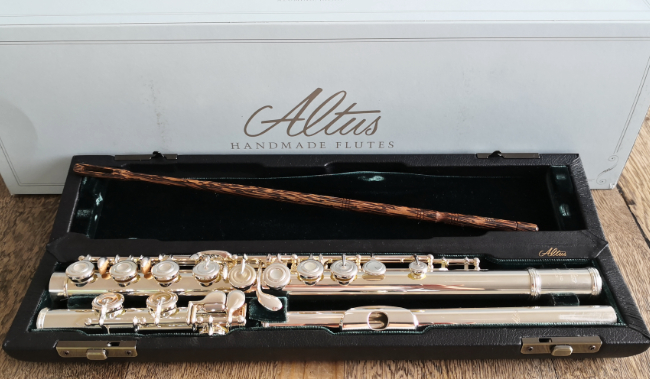August 2021
The flute purchase. My teacher is ill on the appointed day. I call both shops to tell them and postpone the appointment. Both advisors nevertheless encourage me to try out the instruments on my own.
My preference: a silver headjoint and ring keys. And I have a price limit, but it could be adjusted upwards a little.
 In the first shop, four flutes are prepared for testing. A Yamaha, the Tomasi from Vienna and two Azumi.
In the first shop, four flutes are prepared for testing. A Yamaha, the Tomasi from Vienna and two Azumi.
The response on the Yamaha is the fastest. I feel quite comfortable and familiar with it. "Of course," says the advisor, "I'm used to that brand."
Unfortunately, the Tomasi is a bit disappointing. The key mechanism somehow irritates me and as far as my untrained ear can tell, the sound is not so full. I was impressed by this "David against Goliath" attitude: Austria against Japan. Unluckily, the version with the wooden mouth plate cannot be tested for hygienic reasons.
I find the Azumi flutes more interesting. Both have a silver headjoint. One has a silver mouth plate, the other a rose gold one. But I don't really hear much difference.
I am alone in a large room where I can try out the four flutes to my heart's content and without time pressure. But the advisor shows up at regular intervals to help me. I brought two flute schools with me from which I play. Each of the flutes still has silicone plugs in the ring keys, except for the F key. The changeover would not be so quick for a beginner and so I can pay more attention to embouchure and sound when testing.
The Yamaha and the silver Azumi are my favourite instruments. In terms of price, both are below my pain threshold.
Playing and testing them has taken longer than I thought. I'm almost glad that my teacher was ill, because otherwise I would have felt pressed for time.
In the second shop, I asked to be shown only three flutes. I was really keen on the Miyazawa with the hard soldered tone holes. They didn't have this version in stock, but had it delivered especially for me. It was good that this was arranged in advance by phone. Both flute shops were informed that I was a beginner.
This one had a really small room for testing. I have no idea what a trumpet or trombone player would do if he wanted to try out his new instrument in that small ventrikel.
The flute consultant prepared a Miyazawa, an Altus and a Pearl for me. I'm already a bit experienced and can rule out the Pearl from the first second. That was very easy, we both didn't fit together. Instead, she brought me an Altus flute made of solid silver, to have a comparison all the way up. It had a very pure and full sound and I had the feeling that I was holding a much more valuable instrument in my hands. But the price is far, so far above my pain threshold that I preferred to concentrate on the two remaining ones.
The mechanism of the Miyazawa was very smooth and precise, a real pleasure to operate. So light as a feather that it seemed as if it could be moved by my thoughts alone. The sound was bright and clear. The mechanism of the Altus was also smooth but somehow different. I liked the sound as well, it is much warmer.
I can't make up my mind and I'm already tired from all the testing and playing. A short coffee break around the corner is supposed to revive my spirits and decision-making power. But it doesn't work. I have to make another appointment for another day.
I am now really relieved that my flute teacher had to stay at home.
A week later, both flutes are ready for me again. I still have the plan to play refurbished and very high quality flutes at Flutissimo in the back of my mind. But when I tried out the two flutes, it was suddenly very clear that I had to take one of them.
.
My mind really wanted the Miyazawa. I had this great conversation with the representative of the company, hear the advantages of a beautiful sound through the soldered tone holes, feel the extra light key action. An additional pro for the flute would have been the price. It is normally a lot higher than my pricesetting limit, but the manufacturer has offered a substantial discount on all its flutes this year, so that it would have been affordable for me after all.
.
At the second audition, it went super fast. I played them both undercover and knew straight away which one would be mine. I had to decide on the Altus after barely 10 minutes. It was the sound, the sound, the sound. The flute immediately responded to my blowing and reacted to me.
The headjoint of the Altus 907 is made of Britannia silver, which has a higher silver content than sterling silver. The material gives the flute a wider range of overtones and would therefore broaden its musical expression. This doesn't really apply to me, as I am still a beginner. An inexperienced flute-rookie who can't play it at all yet. The mouth hole has a S-cut. According to the description, this headjoint provides vibrant warmth with excellent projection. Its pure tonal center allows the flutist a great flexibility with an infinite color palette. This produces a multi-faceted personal sound, due to a little more blowing resistance. The flute is often chosen by advanced players. I'm glad I didn't know this before, because I think this information would have influenced my choice.
When I drove home, I didn't want to let my new flute out of my arms. I was so happy and filled with ownerships pride that I completely forgot to buy a ticket and therefore went home without paying. The heavenly powers had kindly not provided a ticket control for me on this wonderful afternoon.
At home I had to look at her again and again. She is so beautiful! Still without any scratches or dents. I'm leaving all the silicone plugs in for now. I want to get used to the sound and the changed playing feeling and not be distracted by the unfamiliar ring keys. The two of us have yet to become best friends, even though I'm already quite heavily in love with her.



